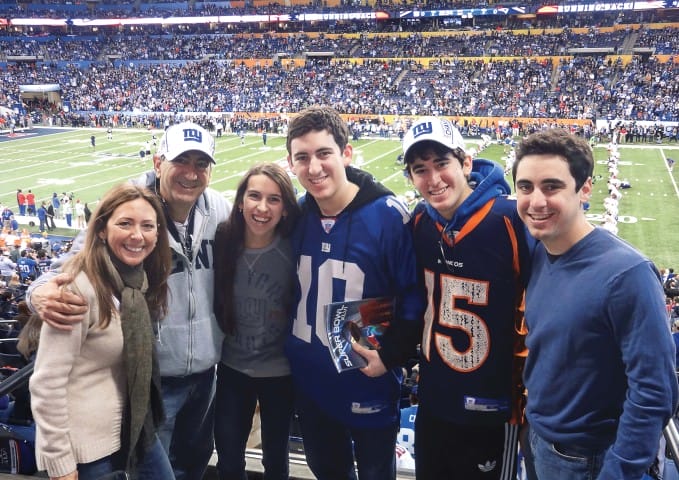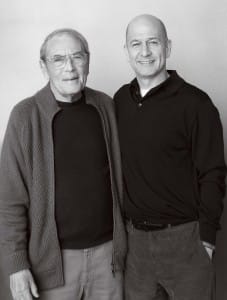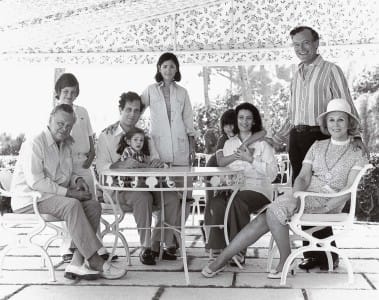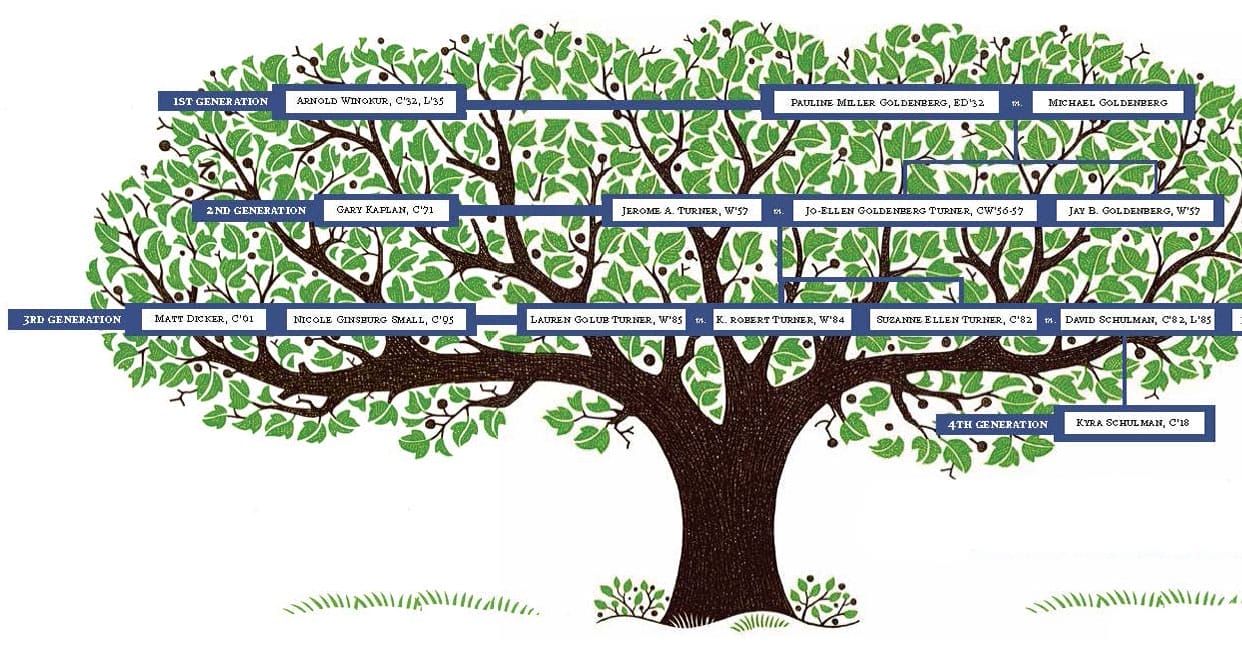The word “pride” just scratches the surface. The intense Wharton educational experience carries over for nearly all graduates into a rewarding, often intimate and lifelong relationship with the School and the alumni community. But imagine also sharing this bond with members of your immediate and extended family— across generations.
Wharton Magazine interviewed four families with roots that run deep on campus and in corporate America: the Huntsman, Lauder, Moelis and Turner families. They share their Penn memories, as well as insights about how their continued engagement with students, professors, administrators and the institution has shaped their businesses and their family lives. Wharton and the University have become part of the family tree, and for them, returning frequently to campus for inspiration and to share their insights and passion isn’t a luxury. It’s a necessity.
The Moelis Family
Even though he graduated from Wharton more than 30 years ago and now runs a global investment bank, Ken Moelis, W’80, WG’81, keeps on making new Penn memories.
To be sure, he has some help from his family—three generations have come through the University, including his mother, father and brother. Still, Ken’s parents did not pressure him to attend Penn. Growing up, he loved listening to his father’s stories about business.
“At a young age, I started investing in the stock market so I had a deep interest in business, which is why Wharton was the obvious choice, as it was the best business school in the country,” he says.
When Ken, a three-decade veteran of Wall Street and founder and CEO of Moelis & Company, was at Wharton, he spent four years living in the Quad—an unusual living arrangement for an upperclassman, but one that paid off. As a sophomore, he met his future wife, Julie Taffet Moelis, W’81.

The Moelis family: (from left ) Julie, Ken, Paige, Jordan, Adam and Cory
Julie was in the pre-med program, but transferred to Wharton after an economics class hooked her with its intellectually stimulating environment. At times, there was some healthy competition between the couple.
“We took statistics together, so that was kind of a memorable time because I actually beat him in that,” she recalls.
As a decision-sciences major, Julie spent more than a few hours working in a room where the computer and stacks of programming cards took up all the real estate—a far cry from the technology students now use inside the Larry and Frances Moelis Online Search Services Room at the Van Pelt-Dietrich Library Center.
Ken also had a chance encounter with technology that changed the course of his career.
“I very much remember being in a Wharton class in investment banking when the head of capital markets for Morgan Stanley came down and went through the IPO economics on a hot IPO of the day,” he recalls. “And that IPO was Apple.”
Ken had planned to become a lawyer. But the course—and the presentation—led him to Wall Street and eventually his own firm in 2007. One of the highlights of traveling the world in pursuit of deals for Moelis & Company is the “amazing camaraderie” he feels whenever he meets Wharton graduates abroad.
“We may not share the same country, but our time at Wharton is a great connector,” he says.
And in a tradition that spans three decades, Ken takes pride in returning to Wharton each year for recruiting sessions.
“I love being on campus and still feel like I am one of the students, aligned with their thoughts,” he says. “What is important to me is to relay in person how much I love what I do and how they too could have a great career in the finance industry, meeting brilliant people and working on innovative deals across cutting-edge industries.”
In 2012, Moelis helped to sell the Los Angeles Dodgers for $2 billion, a deal that underscores the high stakes of professional sports. The Wharton Sports Business Initiative, which Julie and Ken support, is also keeping close tabs on this industry as a think tank for research and executive education on the business of sports.
As undergraduates, the couple shared a passion for attending every men’s basketball game. “We slept out for three days,” Ken recalls. “But we had great seats behind the basket. We went to the Final Four.”
Their sons Jordan, W’09, WG’10, a research analyst for a hedge fund in New York, and Cory, W’11, an Internet entrepreneur, frequently engage their parents and grandfather, Herbert, W’53, in discussions about such memories—and how their collective Penn experiences span nearly 60 years. Like his father, Jordan says his parents didn’t expect him to attend Penn. He was already passionate about business, he says, but having “two enthusiastic Wharton fans living in my house certainly didn’t hurt.”
“I grew up seeing photos of my parents on the Quad during Spring Fling, and then to have my own memories from Spring Fling and my own experiences there … [it’s] a fun parallel,” Jordan says. “I feel fortunate that the best school in the world for the topics I wanted to study was also a place where I knew so many members of my family had created such cherished memories.”
Undoubtedly, a new round will be forged this spring when Julie and Ken host a luncheon on the library’s Moelis Terrace in honor of their son Adam’s graduation from Wharton. “The School has kind of been over the years like a home away from home in that we have used it to celebrate so many family milestones,” says Julie.
The Huntsman Family
The portrait of Jon M. Huntsman, W’59, HON’96, hanging in the lobby of the eponymous Wharton hall features this celebrated Wharton son standing amid the mountains of Deer Valley, Utah. A closer examination of the painting by Mark Skolsky reveals that Jon, founder and executive chairman of the Huntsman Corp., is wearing a silver belt buckle with the letter “H” stamped on it. This is no ordinary buckle—it’s a family heirloom from his great-great-grandfather, Gabriel, an early Mormon pioneer. The precious object has been passed down for six generations along with the values the family holds dear.
Jon, of course, is also a pioneer—in philanthropy. He and his family have blazed a path by making it their life’s work to give back to others, donating more than $1.4 billion to charitable causes, including Penn.
“My heart has always felt that I should give it away. As fast as I make it, I should donate it to good causes,” says Jon, who now serves as chairman emeritus of the Board of Overseers for Wharton and as trustee emeritus for the University.
His journey to Wharton began in 1955, when by chance, as a high school senior in Palo Alto, Calif., he had the opportunity to meet with Raymond Saalbach, G’49, GRD’50, GRD’52, director of admissions for Wharton, and Harold Zellerbach, W’17, a university trustee. Prior to the meeting, Jon knew nothing of Wharton; he had recently moved to California from Idaho. After the remarkable encounter, he had a full scholarship, complete with room and board.
To make ends meet at Wharton, he delivered flowers and bussed tables. And in order to visit his parents in California, he had to hitchhike—a nonstop, three-day adventure he completed eight times as an undergraduate, often with fellow Navy ROTC classmates.
On campus, he was a member of Sigma Chi and tried his hand at basketball: “I hold the record as the lowest scoring varsity player in the history of the University, which I greatly treasure,” he says (he scored one point against Cornell in the last game of the season). But he also went on to win the highest academic honor for undergraduates—the Spoon Award.
Still, it’s the relationships he created and maintained with students, faculty and alumni that have fueled his engagement with the School since graduation. Two decades ago, the Huntsman Program in International Studies & Business was born to provide a forum for outstanding undergraduates who want to pursue dual degrees from Wharton and the School of Arts and Sciences.
A decade ago, when former Dean Tom Gerrity, HOM’90, who had helped him start the Jon M. Huntsman School of Business at Utah State University, was looking for a lead gift to build Wharton’s new home base, the seasoned dealmaker didn’t hesitate: In five minutes, the deal to help his extended family was done. Jon wanted the University to name the building for someone who had made a significant difference in the community. The University chose him, naming it the Jon M. Huntsman Hall. He was hesitant to accept such a great honor.
“It was just because of my love for the University and my great affection for an institution that has taken such wonderful care of me and had given me an education— much more than just classically—and an association, and broken me out of an Idaho farm boy mode,” he says.
Jon has succeeded in helping more than 5,000 young men and women, many from underserved communities, complete their journey into higher education—modeling these scholarships on the Zellerbach family scholarship that he received to attend Wharton.
Among the many Wharton phrases and mottos on plaques that occupy a special place in his office is this one: “It’s not the sermons you give, it’s the sermons you live.”
This aphorism resonates with three generations of the Huntsman family that have attended Penn, including five of Jon’s children, among them the Honorable Jon Huntsman Jr., C’87, HON’10, the two-time governor of Utah, two-time U.S. ambassador to both China and Singapore, and 2012 Republican presidential candidate, as well as grandchildren, such as Allison Huntsman Morgan, who is completing her master’s in nonprofit leadership at the School of Social Policy & Practice.
“I am very proud to be a Penn Quaker,” says Allison, who was born in Philadelphia and was treated to a special campus tour by her father, David, C’92, and her grandfather. “It’s something I always grew up wanting to do, and now that it’s actually happening, it feels almost surreal that I’m actually living out this dream of mine.”
Penn comes up a lot in family conversations. In addition to receiving an outpouring of Penn pride when she was admitted, Allison says, she was also given a Huntsman guide in the form of “a long list” of professors to look up, restaurants to try and housing suggestions to help her feel at home on campus and in the city.
After interning at the Huntsman Cancer Foundation, which supports the innovative research and treatments carried out by the Huntsman Cancer Institute in Salt Lake City, Allison is studying philanthropy and learning how to manage nonprofits.
“Ideally, I would love to be part of the third generation that helps out with the foundation and carries on my grandpa’s legacy,” she says.
Jon has already passed the torch: He recently gave Allison, along with each of his 56 grandchildren, a replica of the “H” belt buckle to inspire future Huntsman generations to stay connected to their family roots and their longstanding tradition of community service—and above all, a loyalty to Penn.
The Turner Family
Jerry Turner, W’57, grew up eating business for breakfast, lunch and dinner. It was a constant source of conversation around the Turner family table in Omaha, Neb. When it came time for college, Wharton was the natural choice because it was the best business school in the country. But when he graduated from Omaha’s Central High School and drove East, excited to start at Wharton, he had a rude awakening: “There were about 300 in our class and they sat us all down in the auditorium and they said, ‘Look to your left, look to your right: One of you will be gone by midsemester.’”
The prediction was correct, and within months one-third of the class was gone. Jerry survived by diving into his business and liberal arts studies. He followed in his family’s tradition by joining Zeta Beta Tau and immersing himself in Penn’s campus life.
“Everything about it built character, built discipline,” he recalls. “It also built a sense of fairness, which is important in life.”

Second and third generation Penn alums,
Jerry and Bobby Turner
After graduation, Jerry helped transform Brooks into a household name for running shoes. For his next move, he started American Sporting Goods in the early 1980s with his wife-to-be, Margaret Uon, and her family. He became a legend in the athletic shoe business when in 2004 he was inducted into the Sporting Goods Industry Hall of Fame (along with the chairman of Nike).
Jerry never forgot his roots. When he and his wife retired, they established the Margaret Uon and Jerry Turner Scholarship to enable students from Omaha’s Central High School to attend Wharton or Penn.
“All of us have tried to take our social responsibilities very seriously,” he says of the four generations of Turners who have attended the University.
Among those is son K. Robert “Bobby” Turner, W’84, founder and CEO of Turner Impact Capital, a mission-driven real estate investment management firm focused on “creating sustainable solutions to many of today’s societal problems through the development of impactful infrastructure,” Bobby says.
Prior to founding Turner Impact, Bobby established himself as a pioneer in the area of social impact investing. As former chairman and CEO of Canyon Capital Realty Advisors LLC, he was responsible over the past two decades for launching several groundbreaking funds that have helped define the “triple bottom line” investment movement. Through partnerships with Andre Agassi, focusing on the development of learning friendly, environmentally responsible charter school facilities, and with Earvin “Magic” Johnson, focusing on inner-city and urban real estate development, Bobby has dedicated himself to providing sound financial returns for investors and fostering opportunities for residents of the communities in which his funds invest, all while embracing environmental responsibility.
All this began with his education at Penn. From one generation to the next, Penn is part of the fabric of the Turner’s lives.
“I never thought about going to another school,” Bobby says. “The Turner family, when we bleed, we bleed red and blue.”
Even Bobby’s 10th-grade daughter, who has yet to apply to college, has a Penn smartphone case. This school spirit is on display whenever he’s on campus to participate in the Lauren & Bobby Turner Social Impact Executive Speaker Series. Its mission is to provide students with tools to become good corporate citizens who are environmentally responsible and aim to have beneficial impact on society.
“What I realized years ago is that making money and making positive societal change need not be mutually exclusive,” Bobby says. “In fact, they’re accretive and symbiotic to some extent. There’s an interdependency between profits and purpose.”
He brings this message to campus with an A-list of celebrities. The speaker series roster has included Agassi, Johnson, Ashton Kutcher and Eva Longoria, among others. Bobby often captivates the crowd himself, ensuring the result is both entertaining and educational as he personally interviews the guests.
“They will all tell you that what they’re most proud of—what has made them most happy—has not been their fame or fortune but the impact they’ve been able to have on other people’s lives as a result of their fame and fortune,” he says.
Recently, wife Lauren Golub Turner, W’85, and Bobby also started a new initiative—the Turner Social Impact Society—to foster collaboration among 11 schools on campus to find solutions to pressing social problems. The innovative three-semester program integrates course work, an internship and the creation of a sustainable business model to tackle the societal issue.
The Lauder Family
Staying engaged with Wharton as a philanthropist and a lecturer is a tall order, especially for someone who’s leading a multibillion-dollar company. But William P. Lauder, W’83, the executive chairman of The Estée Lauder Companies, embraces the challenge and the opportunity for continued learning.
He’s at the helm of a company first started by his grandparents and then expanded by his father, chairman emeritus of The Estée Lauder Companies, Leonard A. Lauder, W’54, and his uncle, chairman of Clinique Laboratories, the Honorable Ronald S. Lauder, W’65.
“I look at my role as a stewardship—taking it from a very entrepreneurial generation to a much larger multinational generation with a very strong strand of DNA of entrepreneurial spirit inside of the larger company,” William says.
Having a Wharton background has proved invaluable for this mission. Yet when it came time for college, there wasn’t any family expectation or pressure to attend Penn. Ultimately, he says, he chose Wharton over other first-rate schools in more rural locales because he was a “city kid” and felt most comfortable in the Penn environment.

Members of the Lauder family: (from left) Joe, William, Ronald, Aerin, Jo Carole, Gary, Evelyn, Leonard and Mrs. Estée Lauder. This photograph was taken in 1972.
“It’s not just the basics in reference to technical knowledge that I acquired, but also the more inferential knowledge and the way of thinking,” he says. “The value of that education is so important, as well as the time and experience one gets [from] being around peers who have similar interests. That’s part of the whole campus experience.”
One course, among many, that provided helpful insights was Professor Laurent Jacque‘s course on currency, which helped him understand the dynamics and role it plays in a multinational company, William says.
William also sought out team-taught classes in business, urban planning and astronomy that showcased each professor’s perspectives during spirited classroom interactions—something he’s tried to replicate as a lecturer at Wharton. In his teamtaught course for second-year MBA students, “Decision-Making in the Leadership Chair,” William brings industry leaders into the classroom for lively interactions with students. He hopes to expand this format of teaching at Wharton going forward.
The global reach of The Estée Lauder Companies is something the family sought to replicate for future business leaders when brothers Leonard and Ronald Lauder honored their father in 1983 with the establishment of the Joseph H. Lauder Institute of Management & International Studies. The program, which has trained more than 1,600 people since its inception, combines a Wharton MBA or a Penn Law J.D. with intensive foreign language study and a M.A. in international studies from the School of Arts & Sciences.
“I think the vision that my father and my uncle had in starting the Lauder Institute—and what it has meant to international business education—was tremendous,” he says. “And if you realize that 30 years ago, the vast majority or Wharton students, undergraduate or graduate, were Americans. And now it’s a very international school—especially in the graduate school.”
Of particular interest to the Lauder Foundation, as well as emeritus trustee Stephen Heyman, W’59, and his wife Barbara, is improving the freshman experience with the creation of the New College House, which will be built on Hill Field. Lauder, a member of the board of trustees for the University, says creating a common experience for freshman will create cohesion that “helps them to both appreciate what the University has to offer as well as feel a strong filial bond to the University that will keep them engaged for many generations.”
Three generations of Lauders have felt this Penn bond. Aerin Lauder, C’92, who focused on visual communications courses while at Penn, says: “My family’s history played a large role in my decision [to attend Penn] because they always told me wonderful things about the school. The decision was also based on the incredible academic program.”
“Being exposed to art history and film just really opened up your eyes to learning about all different types of style or culture,” says Aerin, who is the style and image director for the Estée Lauder brand and who is the founder and creative director of her own makeup, fragrance and lifestyle brand, AERIN, launched in 2012.
“When I was creative director of Estée Lauder, working with different parts of Europe or Asia, understanding the different visual cues for the different cultures was very important.”
As a Penn student, William also experienced the joy of discovery that came from being self-motivated.
“There are extraordinary resources available at a university like this,” William says. “Many of them are sitting behind an unmarked door, and somebody is waiting for you to just knock on the door and walk through and say, ‘Here I am.’”
Connect with us: How many generations of your family have enjoyed Penn? Share your story with us—in writing or even as a podcast or video—at magazine@wharton.upenn.edu. We’ll collect them all and share as many as possible through our digital platforms.






























